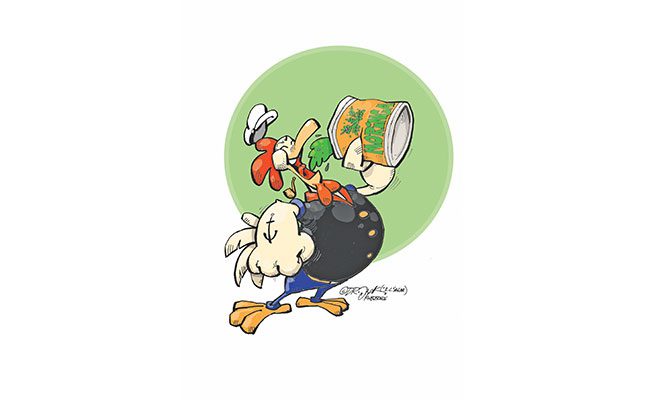
As the global conversation around sustainable farming and healthier food options grows louder, Moringa oleifera (moringa) – a fast-growing, nutrient-rich tree native to tropical and subtropical regions in India and Africa – is emerging as a promising solution that could help address both of these critical issues.
Often referred to as ‘a mother’s best friend’, the ‘drumstick tree’ and the ‘tree of life’, moringa has long been celebrated in traditional medicine for its numerous health benefits.
Role in animal production
However, it is now gaining recognition for its role in animal production, particularly in poultry farming, as an alternative growth promoter and immunity booster.
Broilers are an important and affordable source of high-quality protein for many South Africans and people around the world. The role of smallholder farmers in raising these birds is crucial to ensuring food security within many communities.
Yet, the industry faces numerous obstacles, particularly rising feed costs and increasing concerns about antibiotic use in poultry production. Adding moringa to broiler feed has been shown to improve growth rates, boost immunity and reduce mortality.
This not only offers an ideal alternative to antibiotics in poultry farming but also supports the production of healthier meat for consumers.
Despite these benefits, moringa’s potential as a poultry feed additive remains largely untapped. Key barriers include inconsistent access to moringa in bulk, especially for larger poultry operations, and insufficient education on how to incorporate it effectively into poultry diets.
While smallholder farmers find cultivating moringa relatively easy – owing to its drought-tolerant nature and ability to thrive in challenging environments – the real challenge lies in scaling up production to meet the demands of larger poultry farms.
Without a reliable supply chain, larger producers are understandably hesitant to adopt moringa as a primary poultry feed ingredient.
From a consumer perspective, the potential health benefits of moringa-fed poultry are significant. Moringa is rich in essential nutrients such as vitamins, minerals and antioxidants, all of which are beneficial not only to chickens, but also to the people who consume them.
By supporting poultry that are fed a more natural, nutrient-dense diet, consumers can enjoy meat that is both healthier and more sustainably produced. This creates a win-win situation, enhancing both public health and environmental outcomes.
Integrating moringa into sustainable food systems
Beyond its direct benefits in poultry production, the incorporation of M. oleifera ties into a larger framework of sustainable food systems. As climate change, resource scarcity and public health concerns increasingly dominate global agendas, there is a pressing need for agriculture to evolve.
Moringa cultivation is inherently sustainable as it requires minimal water and inputs, making it well suited to regions facing climatic uncertainties. In fact, studies have shown that moringa trees are exceptionally efficient at carbon sequestration, contributing to the mitigation of climate change impacts.
By promoting moringa as a feed additive, we are also advocating for agricultural practices that support environmental stewardship and climate resilience.
This expanded perspective is particularly relevant in the context of World Health Day 2025, which took place on 7 April and highlighted the critical intersections between health, nutrition and sustainable food production.
The day focused on advancing public health; integrating moringa into poultry farming is a sustainable innovation that not only improves animal health and productivity, but also offers a model for reducing antibiotic dependence – a significant public health concern.
Challenges and the path forward
The research underpinning these findings underscores the promise of M. oleifera as an antibiotic alternative in broiler diets. However, the study also highlights practical challenges. The lack of a consistent supply of bulk moringa and limited farmer awareness are critical hurdles that need to be overcome.
Addressing these issues will require concerted efforts from researchers, policymakers and industry stakeholders. Investment in capacity-building and education initiatives is paramount. By enhancing farmer knowledge and establishing reliable supply chains, we can ensure that the benefits of moringa are realised on a broader scale.
Furthermore, the integration of moringa into sustainable food systems has implications beyond poultry farming. It aligns with the UN’s Sustainable Development Goals – specifically those related to good health, responsible production and climate action.
By adopting practices that reduce reliance on chemical inputs, moringa not only improves the sustainability of poultry production but also supports the development of resilient food systems that can better withstand environmental and economic shocks.
A call to action
In line with the ethos of World Health Day 2025, we must highlight agricultural innovations like the use of moringa in poultry production. By linking improved animal health and productivity with broader sustainable food systems, we can forge a path toward healthier diets and more resilient communities.
The potential adoption of moringa as a natural growth promoter represents a critical step in reimagining how we produce food – a step that benefits farmers, consumers, and the environment alike.
As a researcher with a focus on moringa, I advocate for increased research, public-private partnerships and support systems that facilitate the widespread adoption of sustainable practices.
Let us commit to transforming our food systems to nurture people and the planet.
The views expressed in our weekly opinion piece do not necessarily reflect those of Farmer’s Weekly.
Dr Sharon Nobuhle Lungu has a PhD in animal science and is a former member of the FSNet Africa project under the Centre for the Advancement of Scholarship at the University of Pretoria.
Get trusted farming news from Farmers Weekly in Google Top Stories.
➕ Add Farmers Weekly to Google ✔ Takes 10 seconds · ✔ Remove anytime






